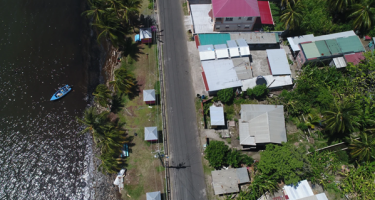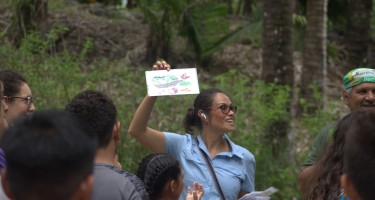Grenada’s Water Wise Transformation
Celebrating water sector reforms and improvements
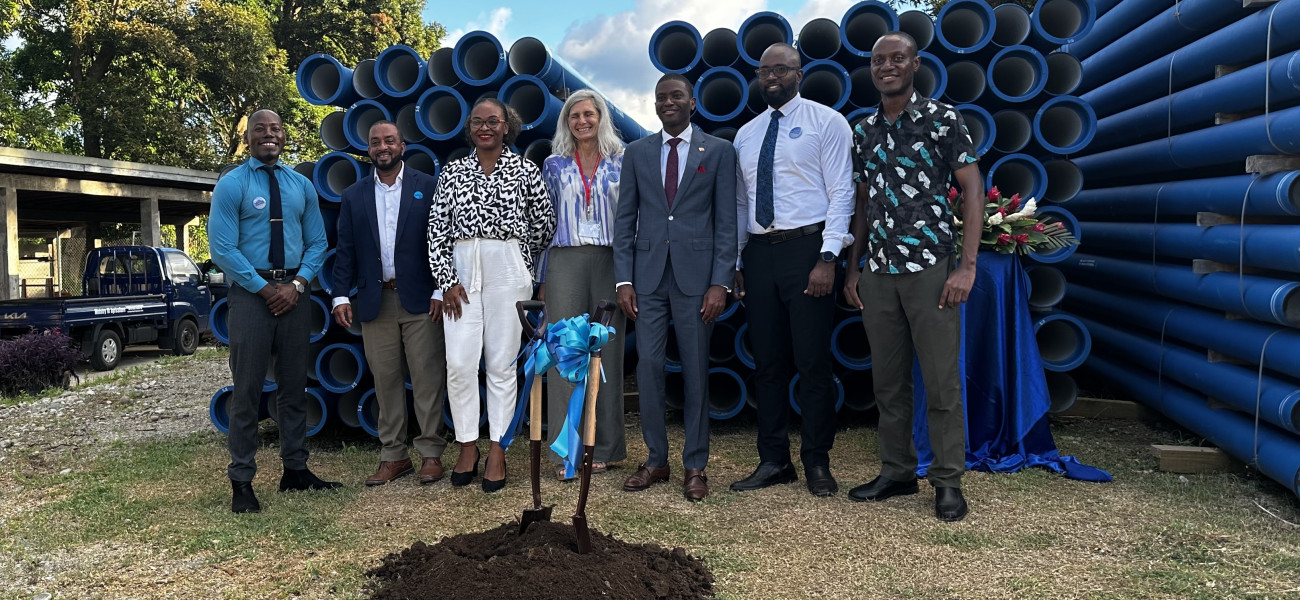
Prime Minister, Hon. Dickon Mitchell, attended the pipelaying sod turning ceremony. © GIZ Grenada Communication Team
Within 2023, the G-CREWS project has increased its visibility in Grenada and beyond and it now ranks high on the political agenda of the Government. Significant progress has been made across the project’s 5 components.
Enhanced Water Governance
First and foremost, the focus has been on improving the water governance of the country to offer a solid base for material improvements of the water sector. The adoption of an Integrated Water Resource Management strategy was enshrined in the Water Resource Management and Regulation Bill, which provides for the creation of a Water Resource Management Unit and is currently being assessed by Grenada’s Minister’s Cabinet.
Advances in regulatory framework improvement also focus on the resilience of the water users. By integrating rainwater harvesting requirements to the building code, the project seeks to make homes and businesses more resilient to climate change. The consultation on the draft regulations was held in November.
With these strong foundations in place, the project complements the regulatory resilience of the country by building awareness about the country’s freshwater challenges and by building role models or “water champions”.
Fostering Water-Conscious Users
Thanks to the Challenge Funds for Agriculture and Tourism, businesses in the tourism and business industries can benefit of up to 100% financing for the rainwater harvesting and water-efficient equipment. 4 hotels implemented water-saving devices and/ or installed rainwater harvesting systems and 216 farms have benefited of water-smart designs, including 176 irrigation systems, 66 shade houses and 145 river/rainwater harvesting systems. Whilst the agriculture sector grant beneficiaries will see their design implemented in 2024, the hotels have already reaped the financial and operational benefit of their installations and share their experience with others in the industry in a docu-video which will be published on the project's Youtube channel.
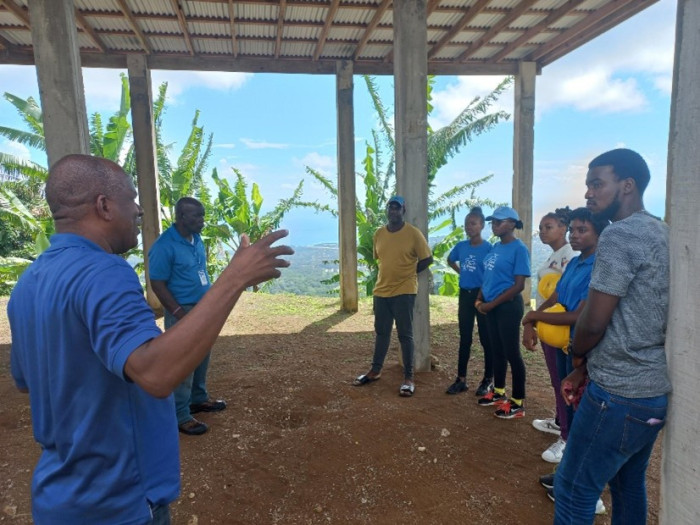
Grenada Water Ambassadors in Training. © GIZ Grenada Communication Team
In July the “Grenada Water Ambassador Programme” was launched under which six young Grenadians were trained in water conservation techniques and community engagement. The youth received targeted training, for instance on rainwater harvesting system design, to be able to design systems for selected households in their communities. As a group, they scheduled a planning of activities which includes household survey or mural painting which will continue into 2024.
Building awareness
The project has rolled out a robust marketing strategy around the theme of water conservation aimed at the general public, including students, homeowners and businesses. The goal is to inform Grenadians of the water challenges facing the country, promoting water conservation behaviour and getting the buy-in from water users for the need for reforms in the water sector.
The campaign used creative strategies to strike a chord with the general public by featuring popular local characters and influencers, Government Ministers, and tapping into Grenadians' pride in their culture and traditions, like Carnival, Socca music and the Christmas season.
© GIZ Grenada Communication Team
© GIZ Grenada Communication Team
Targeting the students, G-CREWS sponsored the annual National Science fair under the theme "Water and Energy Strategies: The key to Sustainable Development” during which 45 schools and 15 water-related projects were showcased. Videos of the displays can be found on the YouTube channel.
Another way to spread prescriptive water conservation behaviour was to advertise on 50 buses plying the roads across the 6 parishes of mainland Grenada which are targeting the thousands of citizens who use public transport every day to access work, schools and other institutions.
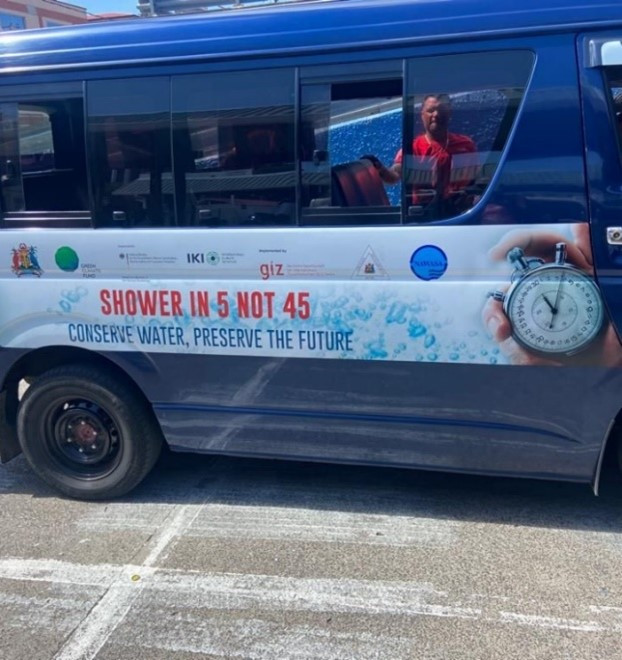
Bus used to communicate water conservation behaviour. © GIZ Grenada Communication Team
Strengthening the water infrastructure
Despite the best efforts from leaders and users to improve their water usage habits, real water sector resilience could not be achieved in Grenada, with an ageing and inadequate infrastructure, if the bulk of the project finance was not directed to reducing leaks and improving the national water reservoirs capacity. In September 2023, the Prime Minister, Hon. Dickon Mitchell, attended the pipelaying sod turning ceremony. The project made substantial progress on the designs and tenders for various infrastructure measures for which installation is expected to begin before the end of the year.
Meanwhile, the national water and sewerage company, NAWASA continues, to improve its implementation of water loss reduction measures. It is in the process of implementing an IT-Supported Asset Management system and its non-revenue water (NRW) reduction activities picked up tremendously and will be strengthened with the upcoming set up of a specialised NRW unit withing NAWASA in the near future, which is being supported by the project.
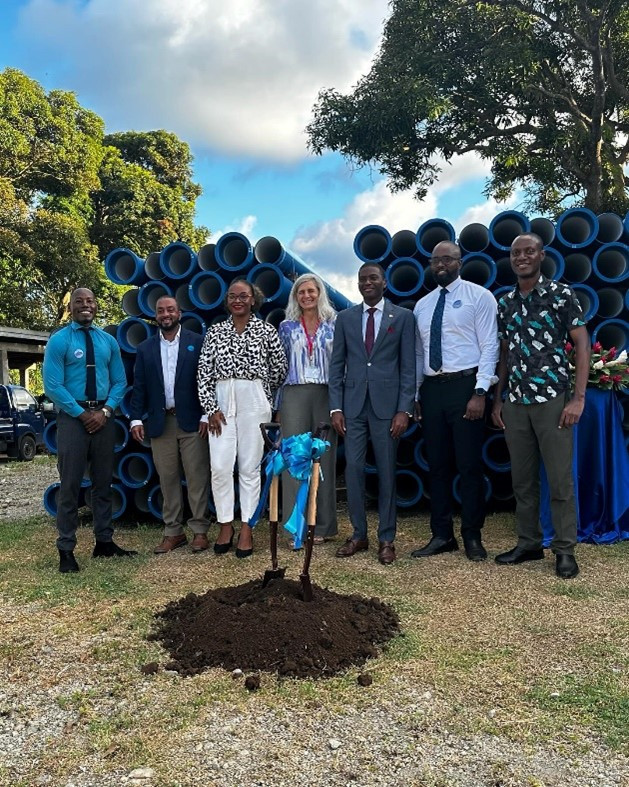
Prime Minister Hon. Dickon Mitchell attends the pipelaying sod-turning ceremony. © GIZ Grenada Communication Team
Regional Learning and Replication
One of the project objectives is to strengthen the regional capacity to develop successful project proposals to the Green Climate Fund by fostering a Regional Climate and Water Resources Community of Practice, a hub for knowledge sharing and collaboration across the Caribbean. To date, the community counts 22 National Designated Authorities from across the Caribbean region and associate members have been invited to join in meetings depending on the topic discussed.
The project participated in several conferences this year including:
- The Caribbean Water Conference in June 2023 in Barbados, where the focus was on increased cooperation across the region and during which the community of practice was introduced to other participants.
- The Caribbean Water and Wastewater Association (CWWA) Annual Conference in October in Guyana where a paper on access to climate finance for the water sector was presented.
- At the Latin America and the Caribbean Climate Week in October in Panama G-CREWS Project Manager for the Government of Grenada participated on a panel on Transformative innovations in the Water Sector. Additionally, the project also held a Ted-Talk style presentation on “Regional Transformation into Water Champions: Conserving Water the Grenada Way”.
The G-CREWS Project was further brought into the spotlight at the 2nd Heads of CARICOM Government Meeting on Climate Matters held in Grenada at the end of September 2023 during which a local schoolboys’ choir performed a song on water conservation that was developed under the project’s communication strategy, giving an energetic momentum to the important regional gathering.
© GIZ Grenada Communication Team
Sharing technical capacity with the partners in the host country
As part of its Environmental and Social Management Plan, the project supported NAWASA to launch and implement its own Occupational Health and Safety (OHS) system. As there is no national legislation that requires OHS policies in companies, NAWASA is one of the few local organisations in Grenada that has one.
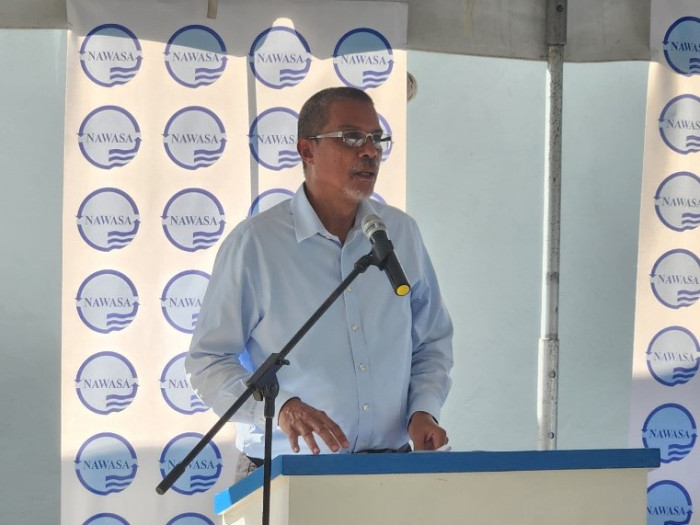
Newly appointed Acting General Manager Terrence Smith endorses the OSH Management System. © GIZ Grenada Communication Team
More information:
G-CREWS | Linktree- Country: Grenada
- Project:
- Contact:
Magali Bongrand
